Moudle6 Problems词汇短语句型精讲 课件(共63张PPT)
文档属性
| 名称 | Moudle6 Problems词汇短语句型精讲 课件(共63张PPT) |
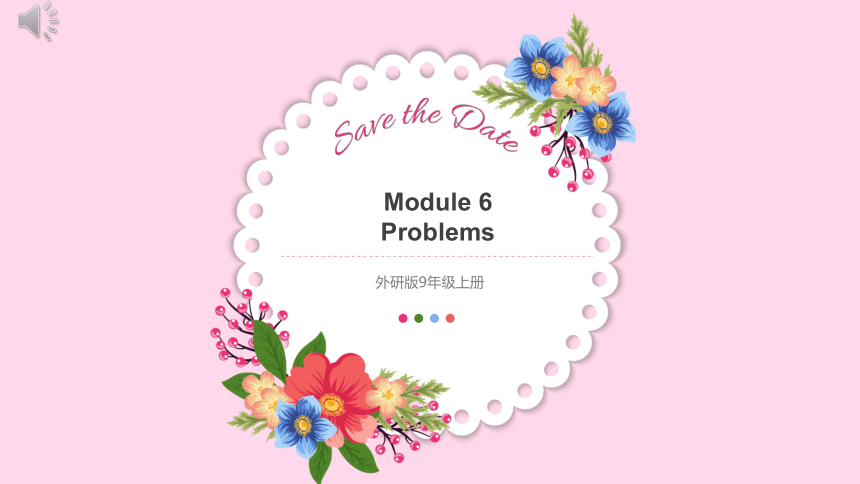
|
|
| 格式 | pptx | ||
| 文件大小 | 13.0MB | ||
| 资源类型 | 教案 | ||
| 版本资源 | 外研版 | ||
| 科目 | 英语 | ||
| 更新时间 | 2021-07-21 00:00:00 | ||
图片预览

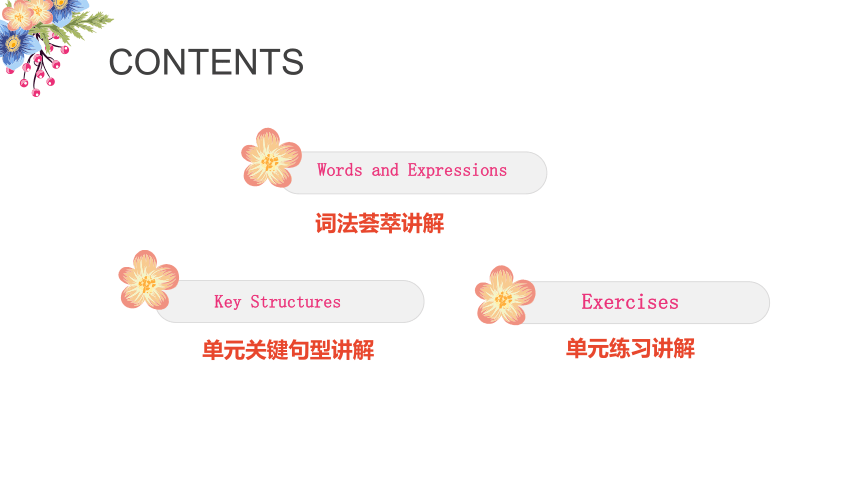

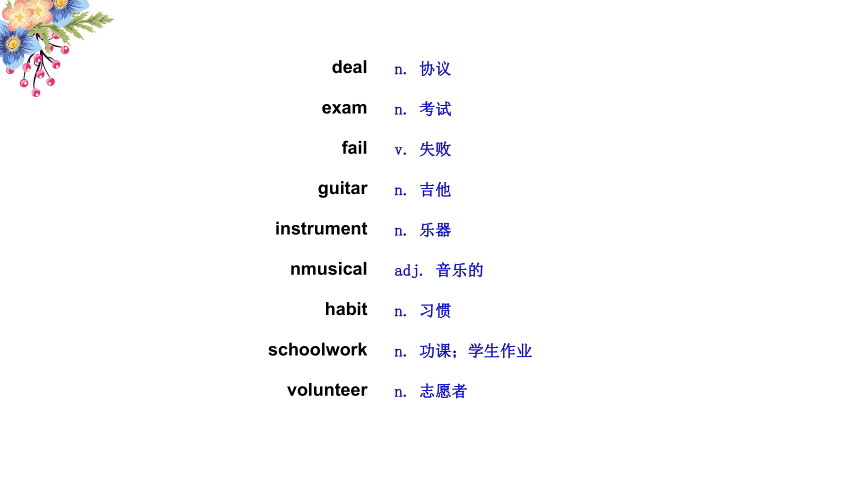
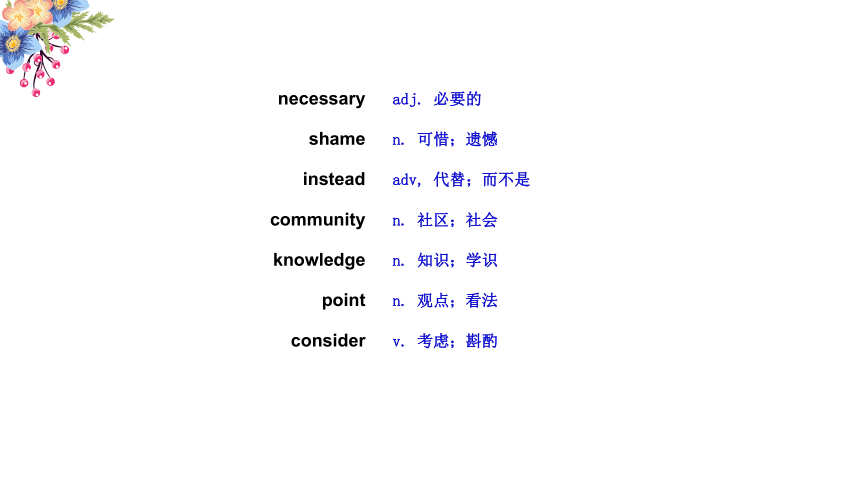
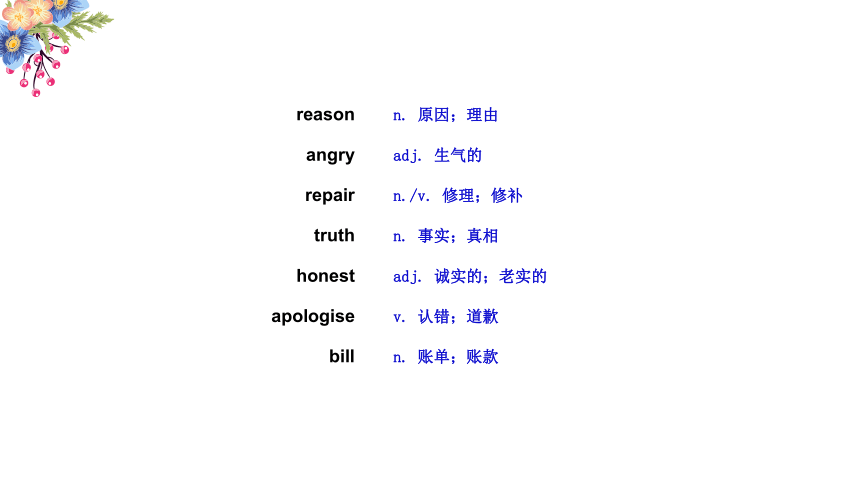
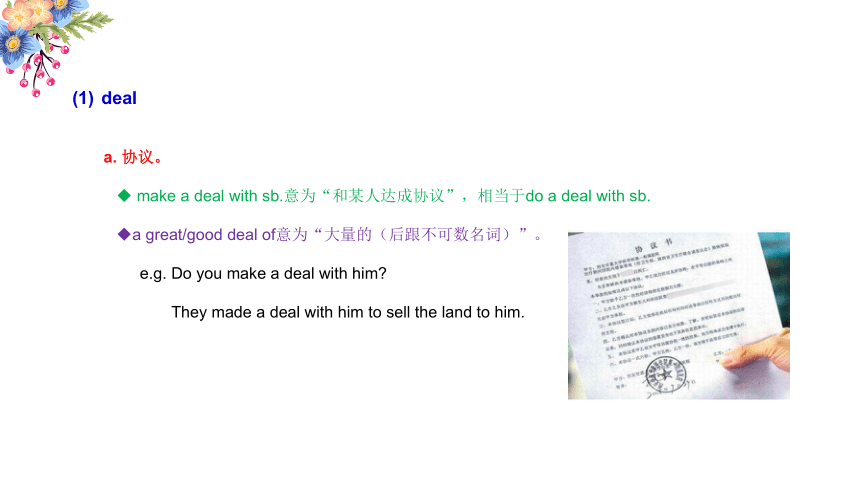
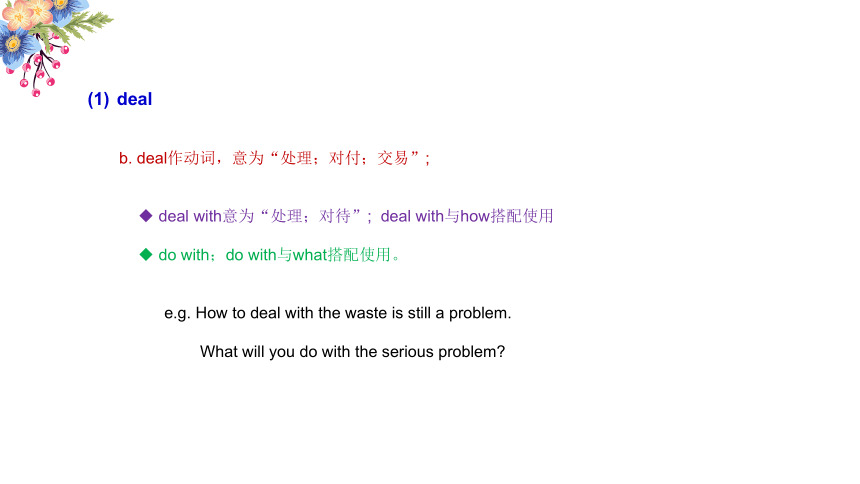
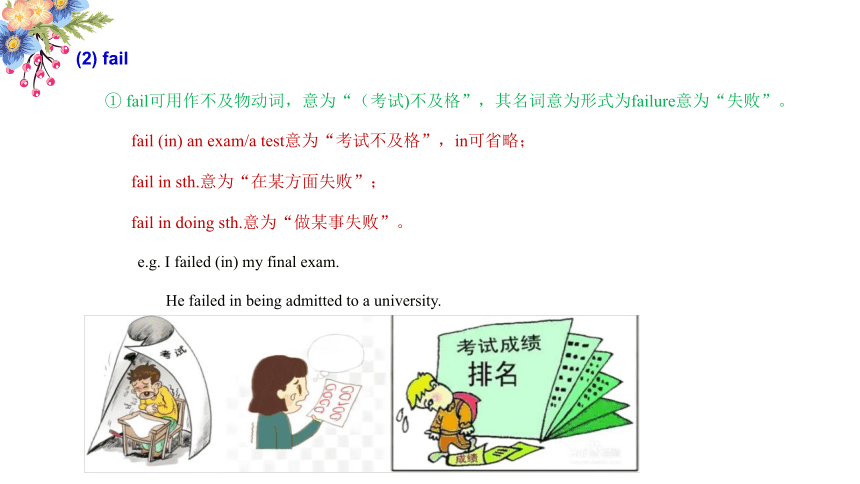
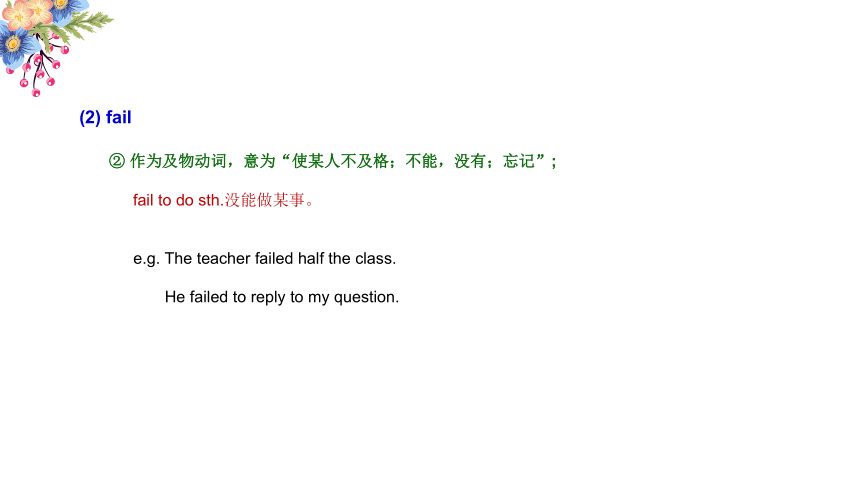
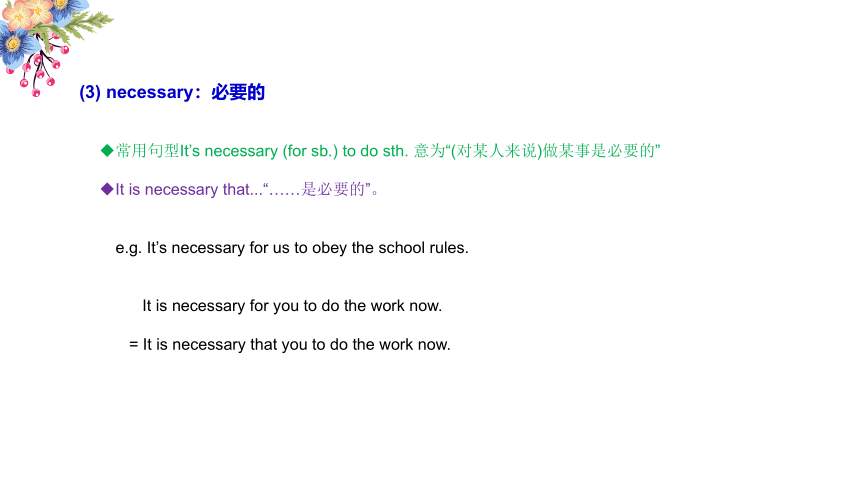
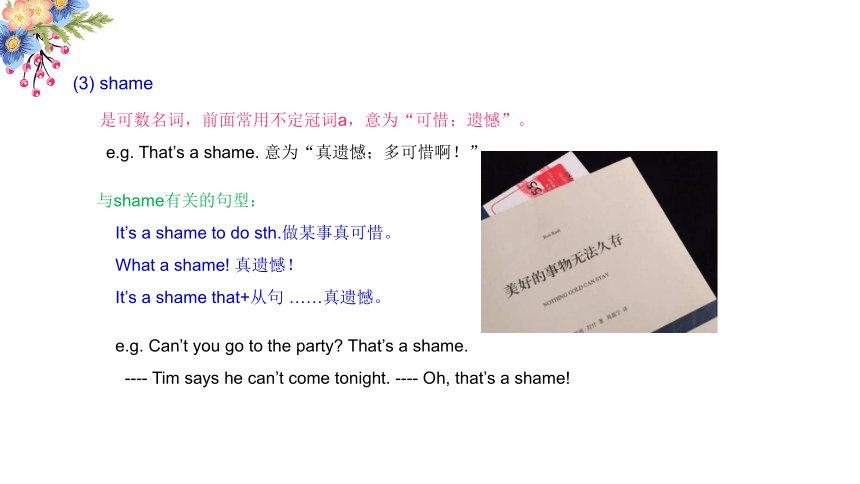
文档简介
(共63张PPT)
Module 6
Problems
外研版9年级上册
词法荟萃讲解
Words and Expressions
单元关键句型讲解
Key Structures
CONTENTS
Exercises
单元练习讲解
01
Words and Expressions
deal
exam
fail
guitar
instrument
nmusical
habit
schoolwork
volunteer
n. 协议
n. 考试
v. 失败
n. 吉他
n. 乐器
adj. 音乐的
n. 习惯
n. 功课;学生作业
n. 志愿者
necessary
shame
instead
community
knowledge
point
consider
adj. 必要的
n. 可惜;遗憾
adv, 代替;而不是
n. 社区;社会
n. 知识;学识
n. 观点;看法
v. 考虑;斟酌
reason
angry
repair
truth
honest
apologise
bill
n. 原因;理由
adj. 生气的
n./v. 修理;修补
n. 事实;真相
adj. 诚实的;老实的
v. 认错;道歉
n. 账单;账款
deal
a. 协议。
make a deal with sb.意为“和某人达成协议”,相当于do a deal with sb.
a great/good deal of意为“大量的(后跟不可数名词)”。
e.g. Do you make a deal with him
They made a deal with him to sell the land to him.
deal
b. deal作动词,意为“处理;对付;交易”;
deal with意为“处理;对待”; deal with与how搭配使用
do with;do with与what搭配使用。
e.g. How to deal with the waste is still a problem.
What will you do with the serious problem
(2) fail
① fail可用作不及物动词,意为“(考试)不及格”,其名词意为形式为failure意为“失败”。
fail (in) an exam/a test意为“考试不及格”,in可省略;
fail in sth.意为“在某方面失败”;
fail in doing sth.意为“做某事失败”。
e.g. I failed (in) my final exam.
He failed in being admitted to a university.
(2) fail
② 作为及物动词,意为“使某人不及格;不能,没有;忘记”;
fail to do sth.没能做某事。
e.g. The teacher failed half the class.
He failed to reply to my question.
(3) necessary:必要的
常用句型It’s necessary (for sb.) to do sth. 意为“(对某人来说)做某事是必要的”
It is necessary that...“……是必要的”。
e.g. It’s necessary for us to obey the school rules.
It is necessary for you to do the work now.
= It is necessary that you to do the work now.
(3) shame
是可数名词,前面常用不定冠词a,意为“可惜;遗憾”。
e.g. That’s a shame. 意为“真遗憾;多可惜啊!”
与shame有关的句型:
It’s a shame to do sth.做某事真可惜。
What a shame! 真遗憾!
It’s a shame that+从句 ……真遗憾。
e.g. Can’t you go to the party That’s a shame.
---- Tim says he can’t come tonight. ---- Oh, that’s a shame!
(3) shame
【拓展】shame 还可以用作可数名词,意为“耻辱;羞耻”。
e.g. He has no shame.
(4) instead
instead of与instead的用法辨析:
① instead of是短语介词,意为“代替;而不是”,通常用于句中,后面可接名词、代词或动 名词等,所跟内容是未做或不做的,不可单独使用。
e.g. If you cannot go, he’ll go instead of you.
I have come instead of my brother. He is ill.
He watched TV instead of doing his homework.
(4) instead
instead of与instead的用法辨析:
② instead作副词,位于句首时,意为“反而”,常用逗号与句子隔开,所跟内容是已做的或
要做的;instead位于句末,意为“代替;顶替”。
e.g. It will take days by car, so let’s fly instead.
He didn’t do his work. Instead, he watched TV.
=He watched TV instead of doing his work.
(5) point
a. 名词:“关键;要点;核心问题”。
e.g. That’s not the point. 表示“那不是重点;那不是问题的关键;那不是我想说的。”
What’s your point
The point is that you haven’t done your homework!
b. 动词,意为“(用手指等)指,指向;指出”,
point to指向;
point at指着;
point out指出。
(5)consider “考虑;斟酌”
常用于以下句型:
① consider+名词/代词/动名词,意为“考虑(做)某事”。
e.g. Please consider the suggestion.
I am considering buying a new computer.
② consider+从句/“疑问词+不定式”,意为“考虑……”。
e.g. Have you considered what he suggested
We must consider what to do next.
(5)consider “考虑;斟酌”
【拓展】consider 意为“认为”,常用于以下句型:
① consider sb./sth.+ (as)+形容词/名词,as可以省略,意为“认为某人/物是……”。
e.g. We consider him honest.
At first they considered me as a doctor.
② consider+sb./sth.+ to do,意为“认为某人/某物……”。
e.g. We consider this matter to be very important.
We all consider him to have stolen the bike.
(5)angry “生气的”
be/get angry with sb.意为“生某人的气”,相当于be mad at sb.。
e.g. I shall be angry with you if you break the cup.
Mr Smith was angry with me because I was late for class.
I was angry with myself for making such a stupid mistake.
(5)angry “生气的”
【拓展】be angry about/at sth.意为“为某事而生气”。
e.g. He was angry about/at the delay
I was angry about/at being kept waiting so long.
(6)repair
repair,mend与fix的用法辨析:这三个词都有“修理”之意。
① repair常指损失重大或构造较复杂的事物,如房屋,汽车,桥梁的修理。
也可指一般的简单修理。
e.g. Mary repaired the radio just for the fun of it.
I am going to have my bike repaired tomorrow.
② mend着重指修补小至日常用具,大到较复杂的物体。很多时候可与repair互换。
e.g. Can you mend a broken dish
She is mending her shoes.
(6)repair
repair,mend与fix的用法辨析:这三个词都有“修理”之意。
③ fix则侧重于“安装”,有时也用作“修理”。
e.g. The workers are fixing the machine.
Have you had your watch fixed
(7)truth
tell sb. the truth意为“说实话;告诉某人真相”
其形容词形式为true意为“真实的;合乎事实的”;
其副词形式为truly意为“真正地;确实地”。
短语to tell you the truth意为“坦白说”。
e.g. I must tell you the truth about it.
If you don’t tell her the truth, you’ll be in deep trouble.
To tell you the truth, I was afraid to see him.
(7)apologise : 道歉
apologise=apologize是动词,意为“认错;道歉”
apologise to sb.向某人道歉;
apologise for (doing) sth.因(做)某事而道歉;
apologise to sb. for (doing) sth.因(做了)某事而向某人道歉。
e.g. I’ve come to apologise to you.
He apologise for being late for the meeting.
I really apologise to you all for what I said yesterday.
(7)apologise : 道歉
【拓展】apologise的名词形式为apology,意为“认错;道歉”
make an apoloy to sb.向某人道歉;
make an apoloy for sth.因某事而道歉;
make an apoloy to sb. for (doing) sth.因(做了)某事而向某人道歉。
e.g. I made an apoloy to her yesterday.
He made an apoloy for what he said.
I really made an apoloy for to you all for what I said yesterday.
get into the habit of
instead of
last ward
come round
try out
no longer
be angry with sb.
at least
pocket money
养成…的习惯
而不是
最后一句话
拜访
试用
不再
生某人的气
至少;起码
零花钱
fail the/one’s exam
stop sb. (from) doing sth.
make a deal with sb.
agree with sb.
be able to
no deal
last word
go wrong
take off
make mistakes
考试不及格
阻止某人做某事
和某人达成协议
同意某人
能;会
不行
最终决定;最后一句话
出毛病;出故障
卸下;取下;
犯错误
pay the bill
offer to do sth
warn sb. (not) to do sth.
by mistake
be worried about...
hurry up
make progress
refuse to do sth.
save up
get into trouble
warn sb. about (not) doing sth.
付账;买单
愿意/主动提出做某事
警告某人(不)要做某事
错误地
担心……
快点
取得进步
拒绝去做某事
存储,积攒
陷入困境;陷入麻烦
警告某人(不要)做某事。
get into the habit of “养成做某事的习惯”
e.g. I get into the habit of listening to music every night.
【拓展】与habit 有关的的搭配:
be in the habit of习惯于;
have a habit of有……的习惯;
break/ give up the habit of改掉/戒除……的习惯;
develop a habit of形成……的习惯。
e.g. Jeff was in the habit of taking a walk after dinner.
She has a habit of playing with her hair when she is nervous.
last word
last word意为“最终决定;最后一句话”。
e.g. In our company the manager has the last word.
I hope that’s not your last word on the subject.
His wife always gets in the last word on everything.
come round “拜访(某人的家)”
come round to one’s house
e.g. Quite a lot of people came round to the house.
He usually comes round at the weekend.
Why don’t you come round for a meal next Friday
表示“拜访”的结构:
drop around/by;
drop in on sb.;
drop in at sp.;
call on sb.;
call at sp.等。
try out “试用;试”
try out是“动词+副词”构成的短语,后接代词时,代词要放在try和out之间,
宾语是名词时,既可以放在try和out之间,也可以放在try out之后。
e.g. I want to try out the new car.
I want to try out some of my ideas.
They are trying out a new computer.
try out “试用;试”
【拓展】由“动词+out”构成的短语:
get out出去;
look out当心;小心;
take out掏出;取出;
give out分发;
hand out发放;
run out用光;
work out计算出。
no longer
no longer与no more的用法辨析:
① no longer意为“不再”,通常放在行为动词前,be动词的后面,相当于not...any longer,
指时间上不再延续,常与持续性动词如live, work, wait,和be动词等连用,但两者在句中的位置不同。
e.g. I could wait for him no longer.=I could not wait for him any longer.
The house no longer belonged to him.=The house didn’t belong to him any longer.
no longer
no longer与no more的用法辨析:
② no more意为“不再”,相当于not...any more,常放动词前,指做某事的数量、程度上不
再增加,常与非延续性动词。
e.g. There is no more bread.= There isn’t bread any more.
The baby no more cried.=The baby didn’t cry any more.
at least
at least意为“至少;起码”,表示最低限度,其反义词组为at most意为“至多”。
e.g. The food was not nice, but at least it was cheap.
It will take you at least twenty minutes to get there.
They haven’t seen each other for at least two years.
It will take two hours at most to get there.
02
Key structures
【辨析】spend,take,cost与pay的用法辨析:
Tony is spending too much time playing the guitar, and he may fail his exams. 托尼花太多时间弹吉他,他可能会考试不及格。
sb. spend time /money on sth. 在……上花费时间(金钱.
sb. spend time /money (in) doing sth. 花费时间(金钱)做某事.
sb. pay + 金钱 for sth.
sb. pay for sth.
it takes (took) sb. + 时间 + to do sth
sth. cost sb. + 金钱
【辨析】spend,take,cost与pay的用法辨析:
Tony is spending too much time playing the guitar, and he may fail his exams. 托尼花太多时间弹吉他,他可能会考试不及格。
主语 花费
spend 人 时间、金钱
pay 人 金钱
take It 时间
cost 物或事 sth. 金钱
1. They spend too much time _______ the report.
A. writing B. to write C. on writing D. write
2. —— What beautiful shoes you’re wearing! They must be expensive.
—— No, they only _______ 20 dollars.
A. spent B. took C. paid D. cost
3. —— Will you please _______ for my dinner, Peter
—— Sure!
A. spend B. cost C. pay D. take
4. Remember to spend some time _______ your loved ones.
A. in B. on C. with D. at
stop sb. (from) doing sth. 意为“阻止某人做某事”,其中from可以省略。
相当于prevent sb. from doing sth.或keep sb. from doing sth.。
e.g. The heavy rain stopped us (from) having a picnic.
We should stop the factories from polluting the air.
I tried to prevent/stop my father from smoking, but failed.
Tony’s parents wants to stop him enjoying music, although they have made a deal with him before. 托尼的父母想要阻止他喜欢音乐,尽管他们之前已和他达成了协议。
Tony’s mum suggests that Tony should have guitar lessons. 托尼的妈妈建议托尼应该上吉他课。
suggest是及物动词,意为“建议;提议”,它的过去式是suggested,它的名词形式是suggestion(复数形式是suggestions)。suggest的用法如下:
① suggest+(that) sb. (should) do sth. 意为“建议某人做某事”,从句用虚拟语气,should可省略,只用动词原形。
e.g. We suggested that he (should) go and make an apology to his teacher.
②suggest+名词。意为“建议某事”。
e.g. Tom suggested an early start.
Tony’s mum suggests that Tony should have guitar lessons. 托尼的妈妈建议托尼应该上吉他课。
suggest是及物动词,意为“建议;提议”,它的过去式是suggested,它的名词形式是suggestion(复数形式是suggestions)。suggest的用法如下:
③ suggest doing sth. 意为“建议做某事”,其后可接名词、代词或动名词,但不能接不定式。
e.g. I suggested going home at once.
④ 表示“向某人建议某事”应用“suggest sth. to sb.”或“suggest to sb.+that从句”。
e.g. What did you suggest to the manager
agree是动词,意为“同意,赞同”。其用法如下:
① agree with sb./what sb. says(接名词、代词或从句)意为“同意某人的意见/看法/某人说的话”。
e.g. My mother doesn’t agree with me to make friends with him.
②agree on/upon+名词,意为“就某事达成一致意见,关于某事意见一致”指协商后在某方面取得一致
意见或达成协议。
e.g. We agreed on making an early start.
We agreed on/upon the price.
Tony’s dad does not agree with Tony’s suggestion. 托尼的爸爸不同意托尼妈妈的建议。
agree是动词,意为“同意,赞同”。其用法如下:
③ agree to (do) sth.(接名词或动词不定式)意为“赞同”某种提议/方法/计划,或“同意”做某事。
e.g. We agreed to leave at once.
I agree to go hiking with him.
④ agree+that从句。意为“同意……”。
e.g. I agree that the book is well worth reading.
She agreed that she could help me with my maths.
Tony’s dad does not agree with Tony’s suggestion. 托尼的爸爸不同意托尼妈妈的建议。
You mean you don’t want me to help the community and increase my knowledge of the world 你的意思是不想让我去社区服务,不让我增加对世界的认知吗?
mean作动词,意为“意思是;意味着”,其用法如下:
① mean doing sth. 的意思是“意味着(必须要做某事或导致某种结果)”,其主语通常是指事物的词。
e.g. Success means working hard.
Being a student means studying hard.
② mean to do sth. 的意思是“打算或企图做某事”,其主语通常是表示人的名词或代词。
e.g. We mean to call on you tomorrow. 我们打算明天看望你。
You mean you don’t want me to help the community and increase my knowledge of the world 你的意思是不想让我去社区服务,不让我增加对世界的认知吗?
mean作动词,意为“意思是;意味着”,其用法如下:
③ mean sb. to do sth.意为“打算让某人做某事”。
e.g. I mean you to work as our spokesman.
Do you really mean him to believe that your plan was right
④ mean+that从句,意为“表示……;意思是……;意味着……”。
e.g. The sign means that the road is blocked.
You mean you don’t want me to help the community and increase my knowledge of the world 你的意思是不想让我去社区服务,不让我增加对世界的认知吗?
mean作动词,意为“意思是;意味着”,其用法如下:
【拓展】询问某词或某句的意思的常用句型:
What does...mean... ……的意思是什么?
What is the meaning of... ……的意思是什么?
What do you mean by... 你说的……是什么意思?
We copied it to the computer, and after we finished playing, we took it off the computer. 我们把它复制到电脑上,我们玩完游戏后,把它从电脑上删除了。
take off意为“卸下;删除;取消”,是固定短语。
e.g. I want to take off the show. 我想取消这场表演。
【拓展】
take off意为“起飞”;其反义词为land,意为“着陆”。
take off还有“脱下,取下”的意思,它的反义词为put on“穿上”。
take off是“动词+副词”构成的短语,后接代词时,代词要放在take和off之间,宾语是名词时,既可以放在take和off之间,也可以放在take off之后。
e.g. When will the plane take off
Your coat is too warm, take it off, please.
If you offer to give up your pocket money, your father will realise that you are very sorry.如果你主动放弃你的零花钱,你爸爸会意识到你的歉意
offer是动词,意为“愿意;提议;提出”。
① offer sth. 意为“提出/供某事物”。
e.g. His father offered a good plan for our holiday.
② offer sb. sth.=offer sth. to sb. 意为“给某人提供某物”。offer后跟双宾语。
e.g. He offered me a cup of tea.= He offered a cup of tea to me. 他请我喝了一杯茶。
③ offer to do sth. 意为“愿意/主动提出做某事”。
e.g. She offered to buy a colour TV.
If you offer to give up your pocket money, your father will realise that you are very sorry.如果你主动放弃你的零花钱,你爸爸会意识到你的歉意
pocket money意为“零花钱”。
e.g. I bought a present for my mother with pocket money.
I think high school students should be given pocket money.
I spent most of my pocket money on junk food several years ago.
Steve did not know how to repair it. 斯蒂夫不知道怎样修好它。
how to repair it意为“怎样修好它”,是“疑问词+不定式”结构,在句中作动词know的宾语。
疑问词what,who,which,when,where,how等词后常接动词不定式(短语),在句中作know,tell,teach,understand,decide等动词的宾语,也可以作主语。
e.g. We can’t decide what to do next.
Do you know how to use the camera
She saved up a lot of money to buy them. 她存了很多钱才买到它们。
save up意为“存储,积攒”,是固定短语,save作动词,意为“节约,节省”。
e.g. We should save up and get a house.
It took me a year to save up for a new coat.
You should save up for your college education.
warn 是动词,意为“警告,告诫”,其用法如下:
① warn sb. about/of (not) doing sth. 意为“警告某人注意/当心(不要)做某事”。
e.g. They warned him of the dangers of sailing alone.
② warn sb. (not) to do sth. 意为“警告某人(不)要做某事”。
e.g. The police warn us not to go out at night.
They have warned him about not working hard. 他们警告过他不要不努力学习。
warn 是动词,意为“警告,告诫”,其用法如下:
③ warn sb. against doing sth. 意为“警告某人不要做某事”。
e.g. He warned me against going there at night.
My teacher warned me against being late again.
④ warn sb.+that 从句。意为“警告某人……”。
e.g. They warned her that she would lose her job.
They have warned him about not working hard. 他们警告过他不要不努力学习。
03
Exercise
1. As students, we should ________ our seat to the old and sick on the crowded bus.
A. lend B. offer C. bring D. take
2. Tony’s mother has warned him ________ up.
A. stay B. not staying C. don’t stay D. not to stay
3. Last Sunday, my grandfather came ______ with a kite.
A. around B. on C. round D. at
4. It is a shame ________such a mistake.
A. make B.to make C. making D. makes
5. You won’t make progress ________ you work hard.
A. if B. unless C. when D. that
6. I am so busy. Don't refuse________ me,will you
A. to help B. helping C. help D. helps
7. There is going to ________ a sports meeting next week. If it ________,we'll have to cancel(取消) it.
A. be;will rain B. have;will rain C. be;rains D. have;rains
8. You will never_________ wrong if you follow his advice.
A. turn B. get C. go D. grow
9. ---When can you finish your homework
---It will ________ me about half an hour.
A. spend B. take C. pay D. cost
10. He bought a pair of new dictionary and it ________ him 40 yuan.
A. cost B. paid C. spend D. took
11. He ________ to swim when he was nine years old.
A. can B. could C. was able D. is able
12. Bill Gates can only use his teacher’s computer ________ his study.
A. at B. to C. for D. on
13. Yao Ming’s parents warned him_______his schoolwork when he was 15.
A.on B. about C. at D. in
14. Daming played football outside instead of ________ the classroom.
A. tidying up B. tidy up C. tidied up D. tidies up
15. I don’t know if it ________ tomorrow. If it _________, we won’t have a picnic.
A will rain; rains; B rains; rains; C rains; will rain; D will rain; will rain
1. As students, we should ________ our seat to the old and sick on the crowded bus.
A. lend B. offer C. bring D. take
2. Tony’s mother has warned him ________ up.
A. stay B. not staying C. don’t stay D. not to stay
3. Last Sunday, my grandfather came ______ with a kite.
A. around B. on C. round D. at
4. It is a shame ________such a mistake.
A. make B.to make C. making D. makes
5. You won’t make progress ________ you work hard.
A. if B. unless C. when D. that
B
D
C
B
B
6. I am so busy. Don't refuse________ me,will you
A. to help B. helping C. help D. helps
7. There is going to ________ a sports meeting next week. If it ________,we'll have to cancel(取消) it.
A. be;will rain B. have;will rain C. be;rains D. have;rains
8. You will never_________ wrong if you follow his advice.
A. turn B. get C. go D. grow
9. ---When can you finish your homework
---It will ________ me about half an hour.
A. spend B. take C. pay D. cost
10. He bought a pair of new dictionary and it ________ him 40 yuan.
A. cost B. paid C. spend D. took
A
C
C
B
A
11. He ________ to swim when he was nine years old.
A. can B. could C. was able D. is able
12. Bill Gates can only use his teacher’s computer ________ his study.
A. at B. to C. for D. on
13. Yao Ming’s parents warned him_______his schoolwork when he was 15.
A.on B. about C. at D. in
14. Daming played football outside instead of ________ the classroom.
A. tidying up B. tidy up C. tidied up D. tidies up
15. I don’t know if it ________ tomorrow. If it _________, we won’t have a picnic.
A will rain; rains; B rains; rains; C rains; will rain; D will rain; will rain
C
C
B
A
A
感谢您的观看
Module 6
Problems
外研版9年级上册
词法荟萃讲解
Words and Expressions
单元关键句型讲解
Key Structures
CONTENTS
Exercises
单元练习讲解
01
Words and Expressions
deal
exam
fail
guitar
instrument
nmusical
habit
schoolwork
volunteer
n. 协议
n. 考试
v. 失败
n. 吉他
n. 乐器
adj. 音乐的
n. 习惯
n. 功课;学生作业
n. 志愿者
necessary
shame
instead
community
knowledge
point
consider
adj. 必要的
n. 可惜;遗憾
adv, 代替;而不是
n. 社区;社会
n. 知识;学识
n. 观点;看法
v. 考虑;斟酌
reason
angry
repair
truth
honest
apologise
bill
n. 原因;理由
adj. 生气的
n./v. 修理;修补
n. 事实;真相
adj. 诚实的;老实的
v. 认错;道歉
n. 账单;账款
deal
a. 协议。
make a deal with sb.意为“和某人达成协议”,相当于do a deal with sb.
a great/good deal of意为“大量的(后跟不可数名词)”。
e.g. Do you make a deal with him
They made a deal with him to sell the land to him.
deal
b. deal作动词,意为“处理;对付;交易”;
deal with意为“处理;对待”; deal with与how搭配使用
do with;do with与what搭配使用。
e.g. How to deal with the waste is still a problem.
What will you do with the serious problem
(2) fail
① fail可用作不及物动词,意为“(考试)不及格”,其名词意为形式为failure意为“失败”。
fail (in) an exam/a test意为“考试不及格”,in可省略;
fail in sth.意为“在某方面失败”;
fail in doing sth.意为“做某事失败”。
e.g. I failed (in) my final exam.
He failed in being admitted to a university.
(2) fail
② 作为及物动词,意为“使某人不及格;不能,没有;忘记”;
fail to do sth.没能做某事。
e.g. The teacher failed half the class.
He failed to reply to my question.
(3) necessary:必要的
常用句型It’s necessary (for sb.) to do sth. 意为“(对某人来说)做某事是必要的”
It is necessary that...“……是必要的”。
e.g. It’s necessary for us to obey the school rules.
It is necessary for you to do the work now.
= It is necessary that you to do the work now.
(3) shame
是可数名词,前面常用不定冠词a,意为“可惜;遗憾”。
e.g. That’s a shame. 意为“真遗憾;多可惜啊!”
与shame有关的句型:
It’s a shame to do sth.做某事真可惜。
What a shame! 真遗憾!
It’s a shame that+从句 ……真遗憾。
e.g. Can’t you go to the party That’s a shame.
---- Tim says he can’t come tonight. ---- Oh, that’s a shame!
(3) shame
【拓展】shame 还可以用作可数名词,意为“耻辱;羞耻”。
e.g. He has no shame.
(4) instead
instead of与instead的用法辨析:
① instead of是短语介词,意为“代替;而不是”,通常用于句中,后面可接名词、代词或动 名词等,所跟内容是未做或不做的,不可单独使用。
e.g. If you cannot go, he’ll go instead of you.
I have come instead of my brother. He is ill.
He watched TV instead of doing his homework.
(4) instead
instead of与instead的用法辨析:
② instead作副词,位于句首时,意为“反而”,常用逗号与句子隔开,所跟内容是已做的或
要做的;instead位于句末,意为“代替;顶替”。
e.g. It will take days by car, so let’s fly instead.
He didn’t do his work. Instead, he watched TV.
=He watched TV instead of doing his work.
(5) point
a. 名词:“关键;要点;核心问题”。
e.g. That’s not the point. 表示“那不是重点;那不是问题的关键;那不是我想说的。”
What’s your point
The point is that you haven’t done your homework!
b. 动词,意为“(用手指等)指,指向;指出”,
point to指向;
point at指着;
point out指出。
(5)consider “考虑;斟酌”
常用于以下句型:
① consider+名词/代词/动名词,意为“考虑(做)某事”。
e.g. Please consider the suggestion.
I am considering buying a new computer.
② consider+从句/“疑问词+不定式”,意为“考虑……”。
e.g. Have you considered what he suggested
We must consider what to do next.
(5)consider “考虑;斟酌”
【拓展】consider 意为“认为”,常用于以下句型:
① consider sb./sth.+ (as)+形容词/名词,as可以省略,意为“认为某人/物是……”。
e.g. We consider him honest.
At first they considered me as a doctor.
② consider+sb./sth.+ to do,意为“认为某人/某物……”。
e.g. We consider this matter to be very important.
We all consider him to have stolen the bike.
(5)angry “生气的”
be/get angry with sb.意为“生某人的气”,相当于be mad at sb.。
e.g. I shall be angry with you if you break the cup.
Mr Smith was angry with me because I was late for class.
I was angry with myself for making such a stupid mistake.
(5)angry “生气的”
【拓展】be angry about/at sth.意为“为某事而生气”。
e.g. He was angry about/at the delay
I was angry about/at being kept waiting so long.
(6)repair
repair,mend与fix的用法辨析:这三个词都有“修理”之意。
① repair常指损失重大或构造较复杂的事物,如房屋,汽车,桥梁的修理。
也可指一般的简单修理。
e.g. Mary repaired the radio just for the fun of it.
I am going to have my bike repaired tomorrow.
② mend着重指修补小至日常用具,大到较复杂的物体。很多时候可与repair互换。
e.g. Can you mend a broken dish
She is mending her shoes.
(6)repair
repair,mend与fix的用法辨析:这三个词都有“修理”之意。
③ fix则侧重于“安装”,有时也用作“修理”。
e.g. The workers are fixing the machine.
Have you had your watch fixed
(7)truth
tell sb. the truth意为“说实话;告诉某人真相”
其形容词形式为true意为“真实的;合乎事实的”;
其副词形式为truly意为“真正地;确实地”。
短语to tell you the truth意为“坦白说”。
e.g. I must tell you the truth about it.
If you don’t tell her the truth, you’ll be in deep trouble.
To tell you the truth, I was afraid to see him.
(7)apologise : 道歉
apologise=apologize是动词,意为“认错;道歉”
apologise to sb.向某人道歉;
apologise for (doing) sth.因(做)某事而道歉;
apologise to sb. for (doing) sth.因(做了)某事而向某人道歉。
e.g. I’ve come to apologise to you.
He apologise for being late for the meeting.
I really apologise to you all for what I said yesterday.
(7)apologise : 道歉
【拓展】apologise的名词形式为apology,意为“认错;道歉”
make an apoloy to sb.向某人道歉;
make an apoloy for sth.因某事而道歉;
make an apoloy to sb. for (doing) sth.因(做了)某事而向某人道歉。
e.g. I made an apoloy to her yesterday.
He made an apoloy for what he said.
I really made an apoloy for to you all for what I said yesterday.
get into the habit of
instead of
last ward
come round
try out
no longer
be angry with sb.
at least
pocket money
养成…的习惯
而不是
最后一句话
拜访
试用
不再
生某人的气
至少;起码
零花钱
fail the/one’s exam
stop sb. (from) doing sth.
make a deal with sb.
agree with sb.
be able to
no deal
last word
go wrong
take off
make mistakes
考试不及格
阻止某人做某事
和某人达成协议
同意某人
能;会
不行
最终决定;最后一句话
出毛病;出故障
卸下;取下;
犯错误
pay the bill
offer to do sth
warn sb. (not) to do sth.
by mistake
be worried about...
hurry up
make progress
refuse to do sth.
save up
get into trouble
warn sb. about (not) doing sth.
付账;买单
愿意/主动提出做某事
警告某人(不)要做某事
错误地
担心……
快点
取得进步
拒绝去做某事
存储,积攒
陷入困境;陷入麻烦
警告某人(不要)做某事。
get into the habit of “养成做某事的习惯”
e.g. I get into the habit of listening to music every night.
【拓展】与habit 有关的的搭配:
be in the habit of习惯于;
have a habit of有……的习惯;
break/ give up the habit of改掉/戒除……的习惯;
develop a habit of形成……的习惯。
e.g. Jeff was in the habit of taking a walk after dinner.
She has a habit of playing with her hair when she is nervous.
last word
last word意为“最终决定;最后一句话”。
e.g. In our company the manager has the last word.
I hope that’s not your last word on the subject.
His wife always gets in the last word on everything.
come round “拜访(某人的家)”
come round to one’s house
e.g. Quite a lot of people came round to the house.
He usually comes round at the weekend.
Why don’t you come round for a meal next Friday
表示“拜访”的结构:
drop around/by;
drop in on sb.;
drop in at sp.;
call on sb.;
call at sp.等。
try out “试用;试”
try out是“动词+副词”构成的短语,后接代词时,代词要放在try和out之间,
宾语是名词时,既可以放在try和out之间,也可以放在try out之后。
e.g. I want to try out the new car.
I want to try out some of my ideas.
They are trying out a new computer.
try out “试用;试”
【拓展】由“动词+out”构成的短语:
get out出去;
look out当心;小心;
take out掏出;取出;
give out分发;
hand out发放;
run out用光;
work out计算出。
no longer
no longer与no more的用法辨析:
① no longer意为“不再”,通常放在行为动词前,be动词的后面,相当于not...any longer,
指时间上不再延续,常与持续性动词如live, work, wait,和be动词等连用,但两者在句中的位置不同。
e.g. I could wait for him no longer.=I could not wait for him any longer.
The house no longer belonged to him.=The house didn’t belong to him any longer.
no longer
no longer与no more的用法辨析:
② no more意为“不再”,相当于not...any more,常放动词前,指做某事的数量、程度上不
再增加,常与非延续性动词。
e.g. There is no more bread.= There isn’t bread any more.
The baby no more cried.=The baby didn’t cry any more.
at least
at least意为“至少;起码”,表示最低限度,其反义词组为at most意为“至多”。
e.g. The food was not nice, but at least it was cheap.
It will take you at least twenty minutes to get there.
They haven’t seen each other for at least two years.
It will take two hours at most to get there.
02
Key structures
【辨析】spend,take,cost与pay的用法辨析:
Tony is spending too much time playing the guitar, and he may fail his exams. 托尼花太多时间弹吉他,他可能会考试不及格。
sb. spend time /money on sth. 在……上花费时间(金钱.
sb. spend time /money (in) doing sth. 花费时间(金钱)做某事.
sb. pay + 金钱 for sth.
sb. pay for sth.
it takes (took) sb. + 时间 + to do sth
sth. cost sb. + 金钱
【辨析】spend,take,cost与pay的用法辨析:
Tony is spending too much time playing the guitar, and he may fail his exams. 托尼花太多时间弹吉他,他可能会考试不及格。
主语 花费
spend 人 时间、金钱
pay 人 金钱
take It 时间
cost 物或事 sth. 金钱
1. They spend too much time _______ the report.
A. writing B. to write C. on writing D. write
2. —— What beautiful shoes you’re wearing! They must be expensive.
—— No, they only _______ 20 dollars.
A. spent B. took C. paid D. cost
3. —— Will you please _______ for my dinner, Peter
—— Sure!
A. spend B. cost C. pay D. take
4. Remember to spend some time _______ your loved ones.
A. in B. on C. with D. at
stop sb. (from) doing sth. 意为“阻止某人做某事”,其中from可以省略。
相当于prevent sb. from doing sth.或keep sb. from doing sth.。
e.g. The heavy rain stopped us (from) having a picnic.
We should stop the factories from polluting the air.
I tried to prevent/stop my father from smoking, but failed.
Tony’s parents wants to stop him enjoying music, although they have made a deal with him before. 托尼的父母想要阻止他喜欢音乐,尽管他们之前已和他达成了协议。
Tony’s mum suggests that Tony should have guitar lessons. 托尼的妈妈建议托尼应该上吉他课。
suggest是及物动词,意为“建议;提议”,它的过去式是suggested,它的名词形式是suggestion(复数形式是suggestions)。suggest的用法如下:
① suggest+(that) sb. (should) do sth. 意为“建议某人做某事”,从句用虚拟语气,should可省略,只用动词原形。
e.g. We suggested that he (should) go and make an apology to his teacher.
②suggest+名词。意为“建议某事”。
e.g. Tom suggested an early start.
Tony’s mum suggests that Tony should have guitar lessons. 托尼的妈妈建议托尼应该上吉他课。
suggest是及物动词,意为“建议;提议”,它的过去式是suggested,它的名词形式是suggestion(复数形式是suggestions)。suggest的用法如下:
③ suggest doing sth. 意为“建议做某事”,其后可接名词、代词或动名词,但不能接不定式。
e.g. I suggested going home at once.
④ 表示“向某人建议某事”应用“suggest sth. to sb.”或“suggest to sb.+that从句”。
e.g. What did you suggest to the manager
agree是动词,意为“同意,赞同”。其用法如下:
① agree with sb./what sb. says(接名词、代词或从句)意为“同意某人的意见/看法/某人说的话”。
e.g. My mother doesn’t agree with me to make friends with him.
②agree on/upon+名词,意为“就某事达成一致意见,关于某事意见一致”指协商后在某方面取得一致
意见或达成协议。
e.g. We agreed on making an early start.
We agreed on/upon the price.
Tony’s dad does not agree with Tony’s suggestion. 托尼的爸爸不同意托尼妈妈的建议。
agree是动词,意为“同意,赞同”。其用法如下:
③ agree to (do) sth.(接名词或动词不定式)意为“赞同”某种提议/方法/计划,或“同意”做某事。
e.g. We agreed to leave at once.
I agree to go hiking with him.
④ agree+that从句。意为“同意……”。
e.g. I agree that the book is well worth reading.
She agreed that she could help me with my maths.
Tony’s dad does not agree with Tony’s suggestion. 托尼的爸爸不同意托尼妈妈的建议。
You mean you don’t want me to help the community and increase my knowledge of the world 你的意思是不想让我去社区服务,不让我增加对世界的认知吗?
mean作动词,意为“意思是;意味着”,其用法如下:
① mean doing sth. 的意思是“意味着(必须要做某事或导致某种结果)”,其主语通常是指事物的词。
e.g. Success means working hard.
Being a student means studying hard.
② mean to do sth. 的意思是“打算或企图做某事”,其主语通常是表示人的名词或代词。
e.g. We mean to call on you tomorrow. 我们打算明天看望你。
You mean you don’t want me to help the community and increase my knowledge of the world 你的意思是不想让我去社区服务,不让我增加对世界的认知吗?
mean作动词,意为“意思是;意味着”,其用法如下:
③ mean sb. to do sth.意为“打算让某人做某事”。
e.g. I mean you to work as our spokesman.
Do you really mean him to believe that your plan was right
④ mean+that从句,意为“表示……;意思是……;意味着……”。
e.g. The sign means that the road is blocked.
You mean you don’t want me to help the community and increase my knowledge of the world 你的意思是不想让我去社区服务,不让我增加对世界的认知吗?
mean作动词,意为“意思是;意味着”,其用法如下:
【拓展】询问某词或某句的意思的常用句型:
What does...mean... ……的意思是什么?
What is the meaning of... ……的意思是什么?
What do you mean by... 你说的……是什么意思?
We copied it to the computer, and after we finished playing, we took it off the computer. 我们把它复制到电脑上,我们玩完游戏后,把它从电脑上删除了。
take off意为“卸下;删除;取消”,是固定短语。
e.g. I want to take off the show. 我想取消这场表演。
【拓展】
take off意为“起飞”;其反义词为land,意为“着陆”。
take off还有“脱下,取下”的意思,它的反义词为put on“穿上”。
take off是“动词+副词”构成的短语,后接代词时,代词要放在take和off之间,宾语是名词时,既可以放在take和off之间,也可以放在take off之后。
e.g. When will the plane take off
Your coat is too warm, take it off, please.
If you offer to give up your pocket money, your father will realise that you are very sorry.如果你主动放弃你的零花钱,你爸爸会意识到你的歉意
offer是动词,意为“愿意;提议;提出”。
① offer sth. 意为“提出/供某事物”。
e.g. His father offered a good plan for our holiday.
② offer sb. sth.=offer sth. to sb. 意为“给某人提供某物”。offer后跟双宾语。
e.g. He offered me a cup of tea.= He offered a cup of tea to me. 他请我喝了一杯茶。
③ offer to do sth. 意为“愿意/主动提出做某事”。
e.g. She offered to buy a colour TV.
If you offer to give up your pocket money, your father will realise that you are very sorry.如果你主动放弃你的零花钱,你爸爸会意识到你的歉意
pocket money意为“零花钱”。
e.g. I bought a present for my mother with pocket money.
I think high school students should be given pocket money.
I spent most of my pocket money on junk food several years ago.
Steve did not know how to repair it. 斯蒂夫不知道怎样修好它。
how to repair it意为“怎样修好它”,是“疑问词+不定式”结构,在句中作动词know的宾语。
疑问词what,who,which,when,where,how等词后常接动词不定式(短语),在句中作know,tell,teach,understand,decide等动词的宾语,也可以作主语。
e.g. We can’t decide what to do next.
Do you know how to use the camera
She saved up a lot of money to buy them. 她存了很多钱才买到它们。
save up意为“存储,积攒”,是固定短语,save作动词,意为“节约,节省”。
e.g. We should save up and get a house.
It took me a year to save up for a new coat.
You should save up for your college education.
warn 是动词,意为“警告,告诫”,其用法如下:
① warn sb. about/of (not) doing sth. 意为“警告某人注意/当心(不要)做某事”。
e.g. They warned him of the dangers of sailing alone.
② warn sb. (not) to do sth. 意为“警告某人(不)要做某事”。
e.g. The police warn us not to go out at night.
They have warned him about not working hard. 他们警告过他不要不努力学习。
warn 是动词,意为“警告,告诫”,其用法如下:
③ warn sb. against doing sth. 意为“警告某人不要做某事”。
e.g. He warned me against going there at night.
My teacher warned me against being late again.
④ warn sb.+that 从句。意为“警告某人……”。
e.g. They warned her that she would lose her job.
They have warned him about not working hard. 他们警告过他不要不努力学习。
03
Exercise
1. As students, we should ________ our seat to the old and sick on the crowded bus.
A. lend B. offer C. bring D. take
2. Tony’s mother has warned him ________ up.
A. stay B. not staying C. don’t stay D. not to stay
3. Last Sunday, my grandfather came ______ with a kite.
A. around B. on C. round D. at
4. It is a shame ________such a mistake.
A. make B.to make C. making D. makes
5. You won’t make progress ________ you work hard.
A. if B. unless C. when D. that
6. I am so busy. Don't refuse________ me,will you
A. to help B. helping C. help D. helps
7. There is going to ________ a sports meeting next week. If it ________,we'll have to cancel(取消) it.
A. be;will rain B. have;will rain C. be;rains D. have;rains
8. You will never_________ wrong if you follow his advice.
A. turn B. get C. go D. grow
9. ---When can you finish your homework
---It will ________ me about half an hour.
A. spend B. take C. pay D. cost
10. He bought a pair of new dictionary and it ________ him 40 yuan.
A. cost B. paid C. spend D. took
11. He ________ to swim when he was nine years old.
A. can B. could C. was able D. is able
12. Bill Gates can only use his teacher’s computer ________ his study.
A. at B. to C. for D. on
13. Yao Ming’s parents warned him_______his schoolwork when he was 15.
A.on B. about C. at D. in
14. Daming played football outside instead of ________ the classroom.
A. tidying up B. tidy up C. tidied up D. tidies up
15. I don’t know if it ________ tomorrow. If it _________, we won’t have a picnic.
A will rain; rains; B rains; rains; C rains; will rain; D will rain; will rain
1. As students, we should ________ our seat to the old and sick on the crowded bus.
A. lend B. offer C. bring D. take
2. Tony’s mother has warned him ________ up.
A. stay B. not staying C. don’t stay D. not to stay
3. Last Sunday, my grandfather came ______ with a kite.
A. around B. on C. round D. at
4. It is a shame ________such a mistake.
A. make B.to make C. making D. makes
5. You won’t make progress ________ you work hard.
A. if B. unless C. when D. that
B
D
C
B
B
6. I am so busy. Don't refuse________ me,will you
A. to help B. helping C. help D. helps
7. There is going to ________ a sports meeting next week. If it ________,we'll have to cancel(取消) it.
A. be;will rain B. have;will rain C. be;rains D. have;rains
8. You will never_________ wrong if you follow his advice.
A. turn B. get C. go D. grow
9. ---When can you finish your homework
---It will ________ me about half an hour.
A. spend B. take C. pay D. cost
10. He bought a pair of new dictionary and it ________ him 40 yuan.
A. cost B. paid C. spend D. took
A
C
C
B
A
11. He ________ to swim when he was nine years old.
A. can B. could C. was able D. is able
12. Bill Gates can only use his teacher’s computer ________ his study.
A. at B. to C. for D. on
13. Yao Ming’s parents warned him_______his schoolwork when he was 15.
A.on B. about C. at D. in
14. Daming played football outside instead of ________ the classroom.
A. tidying up B. tidy up C. tidied up D. tidies up
15. I don’t know if it ________ tomorrow. If it _________, we won’t have a picnic.
A will rain; rains; B rains; rains; C rains; will rain; D will rain; will rain
C
C
B
A
A
感谢您的观看
同课章节目录
- Module 1 Wonders of the world
- Unit 1 It's more than 2,000 years old.
- Unit 2 The Grand Canyon was not just big.
- Unit 3 Language in use
- Module 2 Public holidays
- Unit 1 My family always go somewhere interesting a
- Unit 2 We have celebrated the festival since the f
- Unit 3 Language in use
- Module 3 Heroes
- Unit 1 She trained hard,so she became a great play
- Unit 2There were few doctors, so he had to work ve
- Unit 3 Language in use
- Module 4 Home alone
- Unit 1 I can look after myself, although it won’t
- Unit 2 I became so bored with their orders that I
- Unit 3 Language in use
- Module 5 Museums
- Unit 1 Don't cross that rope!
- Unit 2 If you ever go to London, make sure you vis
- Unit 3 Language in use
- Module 6 Problems
- Unit 1 If I start after dinner, I'll finish it be
- Unit 2 If you tell him the truth now, you will sho
- Unit 3 Language in use
- Revision Module A
- Module 7 Great books
- Unit 1 We're still influenced by Confucius's idea
- Unit 2 It is still read and loved.
- Unit 3 Language in use
- Module 8 Sports life
- Unit 1 Daming wasn't chosen for the team last time
- Unit 2 He was invited to competitions around the w
- Unit 3 Language in use
- Module 9 Great inventions
- Unit 1 Will computers be used more than books in t
- Unit 2 Will books be replaced by the Internet?
- Unit 3 Language in use
- Module 10 Australia
- Unit 1 I have some photos that I took in Australia
- Unit 2 The game that they like most is Australian
- Unit 3 Language in use
- Module 11 Photos
- Unit 1 He's the boy who won the photo competition
- Unit 2 The photo which we liked best was taken by
- Unit 3 Language in use
- Module 12 Save our world
- Unit 1 If everyone starts to do something, the wor
- Unit 2 Repeat these three words daily: reduce, reu
- Unit 3 Language in use
- Revision Module B
